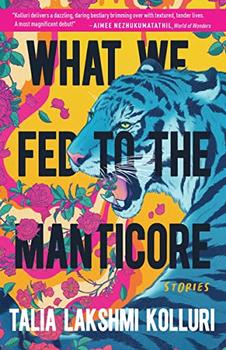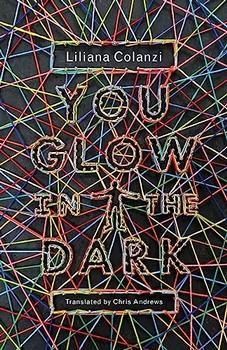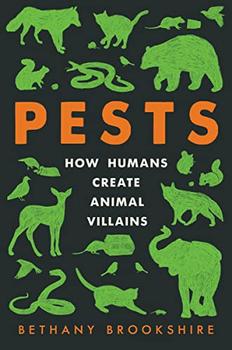Summary | Excerpt | Reviews | Beyond the book | Read-Alikes | Genres & Themes | Author Bio

In nine stories that span the globe, What We Fed to the Manticore takes readers inside the minds of a full cast of animal narrators to understand the triumphs, heartbreaks, and complexities of the creatures that share our world.
Through nine emotionally vivid stories, all narrated from animal perspectives, Talia Lakshmi Kolluri's debut collection explores themes of environmentalism, conservation, identity, belonging, loss, and family with resounding heart and deep tenderness. In Kolluri's pages, a faithful hound mourns the loss of the endangered rhino he swore to protect. Vultures seek meaning as they attend to the antelope that perished in Central Asia. A beloved donkey's loyalty to a zookeeper in Gaza is put to the ultimate test. And a wounded pigeon in Delhi finds an unlikely friend.
In striking, immersive detail against the backdrop of an ever-changing international landscape, What We Fed to the Manticore speaks to the fears and joys of the creatures we share our world with, and ultimately places the reader under the rich canopy of the tree of life.
Perhaps the most compelling part of these stories is how the author has developed the worldviews of the various characters. She brings a feeling not just of their reaction to the current moment, but also of how their species and lives have shaped their understanding of events. Each of the animals has a distinct sense of history and culture. The creation myth of polar bears, the romances of whales and the social customs of sled dogs are all vibrantly brought to life. There is a tradeoff, however. These stories immerse the reader in the question of how other species see the world. They are, as a result, very character-driven, and readers who prefer a focus on events and clear resolution of plots may find them unsatisfying...continued
Full Review
(558 words)
This review is available to non-members for a limited time. For full access,
become a member today.
(Reviewed by Katharine Blatchford).
 In What We Fed to the Manticore, Talia Lakshmi Kolluri uses short stories to explore humans' relationships with various animals, both wild and domestic. Through domestication, people have artificially selected for traits in animals or plants that are useful or appealing to them, creating species that are genetically distinct from their wild cousins. This process has played a key role in humanity's history; without the development of agriculture made possible by domestication, our modern society could not exist.
In What We Fed to the Manticore, Talia Lakshmi Kolluri uses short stories to explore humans' relationships with various animals, both wild and domestic. Through domestication, people have artificially selected for traits in animals or plants that are useful or appealing to them, creating species that are genetically distinct from their wild cousins. This process has played a key role in humanity's history; without the development of agriculture made possible by domestication, our modern society could not exist.
In her nine short stories, only one species is a repeat narrator—the dog. Dogs have certainly earned the nickname "man's best friend." Descended from wolves, many believe they were the very first animals to be domesticated,...
This "beyond the book" feature is available to non-members for a limited time. Join today for full access.

If you liked What We Fed to the Manticore, try these:

by Liliana Colanzi
Published 2024
Introducing the Bolivian writer Liliana Colanzi, You Glow in the Dark glimmers with an unearthly light and a nearly radioactive power

by Bethany Brookshire
Published 2023
An engrossing and revealing study of why we deem certain animals "pests" and others not - from cats to rats, elephants to pigeons - and what this tells us about our own perceptions, beliefs, and actions, as well as our place in the natural world.
Use what talents you possess: The woods would be very silent if no birds sang there except those that sang best
Click Here to find out who said this, as well as discovering other famous literary quotes!